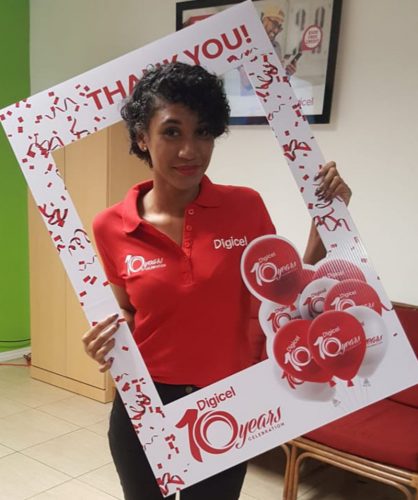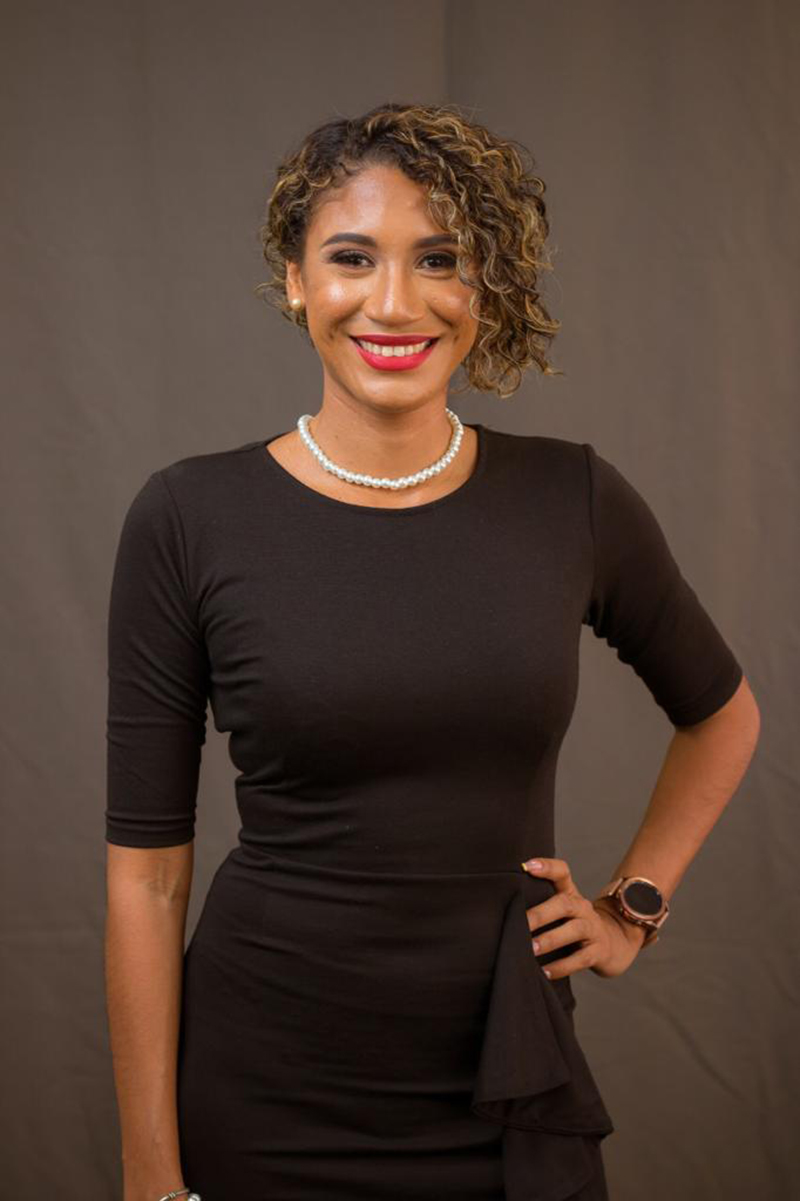When the now fledgling Women’s Chamber of Commerce and Industry Guyana (WCCIG) was launched, its recently elected president Rowena Elliot was skeptical.
Currently the community sales manager of the branch of Regus, a global workspace provider, Elliot, 32, told Stabroek Weekend in a recent interview that she had questioned the need for a chamber of industry and commerce to represent women.
The WCCIG was founded in June 2019 by Lyndell Danzie-Black and Karensa Granvesande-Bart. In 2020, Elliot was elected to the board of seven directors and this year was elected its President.

“Initially when the women’s chamber was launched and we discussed it at the level of Regus, I questioned if it was something that was needed. Why is it the Georgetown Chamber of Commerce and Industry (GCCI) does not give women entrepreneurs more recognition hence women have to create a whole new chamber? Do women really want to be separated or do they want to be a part of that which is already there?”
Elliot started to research women in business locally, found that women were in a way somewhat unseen and unheard in business. “I started to learn more of what the chamber wanted to achieve for women and for Guyana. I became aware that women are left out a lot in decision-making in business. In terms of gender, there is inequality and I realised this chamber is

actually needed.”
Regus joined the chamber in early 2020 and in that year, Elliot was elected to the board, then came the pandemic with all its challenges.
Although not the owner of a business and or a person who faced any discrimination or inequality in business, she said, “Others have related their experiences, including my late friend Denisha Victor, who was very entrepreneurial and who owned KoKo beauty supply store. I heard things from her perspective, the challenges she faced in getting her business off the ground, not only because she was a woman but sometimes, she believed it was also because she was Black. Now I get it. Prior to being exposed to the women’s chamber, I was unaware that so many issues face women in business.”
Victor, who died suddenly last year, was the co-creator of Curl Fete, a social movement that was aimed at empowering women and girls through entrepreneurship and self-love.
In recent months several meetings of private sector entities including the Private Sector Commission, GCCI and Guyana Manufacturing and Services Association were held with representatives of the diplomatic community and potential foreign investors that have excluded any women representation. This included a meeting with the newly-appointed British High Commissioner to Guyana, a woman.
“A lot of women are struggling. There is no policy on gender in the private sector representative bodies and no policy on inclusion. Even if there is no policy, they could include a woman to show inclusion and to save face. We believe that women in decision-making is important. I know there are women on the council of the GCCI. Now more than ever I know that the women’s chamber is definitely needed.”
Going forward, Elliott said she will spend some of her energies on building and increasing its membership and raising awareness of women in commerce and industry.
As the local manager of an international business entity that is seeking to build its portfolio and to network for business purposes, Elliot is also Regus’s representative along with an alternate on the GCCI. She is the primary contact with the American Chamber of Commerce and Industry Guyana (AmCham).
Grounding
How did she get to where she is today, especially considering the fact that she was never into public speaking or advocacy? Elliot credits all the places she has worked to date for shaping who she is and where she wants to go in the future. Prior to joining Regus as a community associate, she was the office manager at a lawyer’s firm, business liaison officer at the Ministry of Tourism, Industry and Commerce, and workforce management analyst and customer service agent at Digicel Guyana.
Though she was never keen on working in the public service, Elliot said, “It wasn’t bad as I expected based on what I had previously heard. I learned a lot. However, I still have some concerns about the public service. I feel there is need for a major reform there.”
Travelling to different parts of the country with the ministry or with Digicel through its corporate social responsibility programme, she said, also enlightened her to the potential and opportunities available to Guyanese.
Her grounding and love for the business and corporate world, and now advocacy, she said, stemmed mainly from the ten years of her working life she spent at Digicel Guyana, where she was also elected a representative of Digicel Guyana Staff Association.
However, she noted that the activities of the staff association were not as far reaching and formal as the chamber’s. “Yes, we worked as a body to get things done on behalf of our colleagues but it was all internal.”
Elliot learned that trying to make improvements on the job as an individual was not as effective as when the staff association put forward the same issues.
“Things work better when you have a body with common concerns. There is power in numbers,” she said.
Born and raised in Georgetown and a 2005 graduate of St Joseph High School (SJHS), Elliot, who shied away from public speaking and debates at the school level, now finds herself into public speaking and advocacy. “I shouldn’t have shied away,” she now admits. However, she took part in sporting activities at the school level and was a student at the National School of Dance. She believes her exposure to the public through national events in which she took part through the dance school enabled her to overcome some of the shyness she had initially experienced. At the school, she danced at graduations and concerts as part of a troupe.
Recommending that students find time to do some form of extra curricula activity, she said it helps in terms of exposure to the public whether it is sports, debating or, as in her case, dancing. “It preps you for some part of interacting with the public.”
Elliot is the holder of a diploma in banking and finance and a bachelor’s degree in business management from the University of Guyana (UG). She also holds a master’s degree in business administration from the Arthur Lok Jack Global School of Business, The University of the West Indies, St Augustine Campus.
Studying was not all that easy, she said, noting that along with two other classmates from SJHS, Denisha Victor and Diana Williams, she decided to seek admission to UG straight from fifth form. “Our goal was to by-pass sixth form and to get onto the business management degree programme as early as possible.”
She began pursuing her bachelor’s degree while she was a customer agent at Digicel, where she began working in 2007.
“At the time, trying to work with a timetable and a shift system was challenging. There were times I had to exchange shifts with colleagues who were cooperative. The good thing was that a lot of the classes had times scheduled to accommodate full time students during the day and working students in the evening. So I spent many late nights on campus and could not take part in extra-curricular activities. I graduated with the bachelor’s degree in 2011.”
She was also working when she completed her master’s degree with the funding of that programme being a challenge. There were times when she wanted to quit but her former classmates, Williams and Victor, who also took the same educational journey as hers, and her boyfriend encouraged her not to quit. She is now toying with the idea of pursuing a doctorate with a focus on project management.
The customer is not always right
Elliot began her working life with Digicel as a customer agent, answering calls on the phone. “If it wasn’t for the restructuring of the company and downsizing in Guyana and the Caribbean in 2017, I might have still been there. I still see Digicel as home. People ask me questions about Digicel, I still tend to say, ‘We’ or ‘Us’. It was a call centre but it was a very corporate environment that was ever changing.”
Some customers could be very rude, argumentative and threatening. “Some tried my patience and tolerance. You have to keep your composure and be very professional even when they are saying the worst things to you.”
Interaction with customers face-to-face was different, she said. However, dealing with customers on the phone developed her passion for excellent customer service.
“I realised I was taught by the best in world-class customer service. So when I go places and get crappy customer service, I question it. I can’t be rude to customers even when the customer comes with a bad attitude or is having a bad day and takes it out on you. I am a stickler for top quality customer service.”
She recalled a customer by name for whom everything was a problem. “He didn’t want his phone to ring and go to voice mail. He wanted that feature off. He didn’t want text messages from Digicel. There is an option by dialing opt out. His problem was that he should not have to do that. I had him several times. He would ask for my name and then he would say he was going to write me up in the newspapers. I reached a point where I became seasoned. It was okay to threaten me and so I spelled my name for him.”
Quality assurance agents are always on the floor and if they think they should intervene they will pick up the call, listen in and guide the agent through such episodes.
At the end of difficult calls, Elliot would report what transpired. Calls are recorded so they can be verified.
Elliot does not subscribe to the maxim that the customer is always right. “While I believe that good customer service is needed, I find some customers are definitely wrong from the get go either mistakenly or they know they are wrong. They try to bully you or the company to fix a problem that cannot be fixed or for something they signed up for and they just want to be difficult.”
At the call centre, she said, she never tolerated customers using indecent language. “As soon as they start doing that, I warned them that if they continued to use that type of language I would be forced to end the call. As long as you communicate that to them and they continue, you can end the call. By protocol the agent is not supposed to end a call.”
A lot of service industries, she said, do not subscribe to the maxim that the customer is always right because some customers come with a fighting attitude about somethings that make no sense or they may argue about a company policy that might be in their own interest or the company’s.
“I have witnessed ‘wrong and strong’ customers mistreating employees, such as waiters and salesgirls.”
After being a customer agent for five years, Elliot saw a vacancy in the company for a work force and scheduling analyst. She applied and was successful. This post enabled her to work with staff in other departments, including technical and commercial, who she had rarely met with before. “I was also able to support the call centre in a bigger role.”
During her tenure with Digicel she joined the staff association, which stood in place of a trades union. The team she elected to join to contest the elections for office bearers served for three years.
“We reached out to the human resources department, management and the chief executive officer to deal with the concerns of our colleagues. Whether they were industrial in nature or not, they were dealt with effectively, including that of parking space for management, staff and customers.”
“Digicel had an open door policy from the CEO to all the managers. “They would encourage you to knock on the door. We were all on first name basis. It was never Mr This or Mr That. We ate with the CEO in the lunch room. We had our issues but management didn’t make it difficult to deal with them,” she said.






